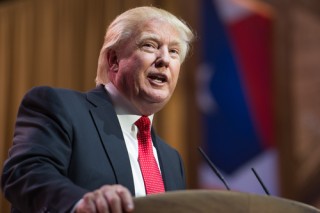 Imagine a world where the President of the United States has his own multimedia network to spread their message all over the world, including propaganda to the American people. No, this isn’t the premise for a novel or film set in a dystopian future. It’s our current reality.
Imagine a world where the President of the United States has his own multimedia network to spread their message all over the world, including propaganda to the American people. No, this isn’t the premise for a novel or film set in a dystopian future. It’s our current reality.
A small portion of the new National Defense Authorization Act (NDAA) modifies the inner-workings of Voice of America (VOA), the primarily news-based network that broadcasts American state-sponsored messages in markets across the globe. Initially a tool used to counter Nazi propaganda in Europe during World War II, and later Soviet propaganda in the Cold War, VOA was meant to be just that — the voice of America projected internationally. In some areas, it gives an opposition to anti-American messages, and in others it provides news to people who may not have news sources outside their own government’s channels.
VOA is currently run by a Broadcasting Board of Governors (BBG), which also runs similar services like Radio Free Europe and the Middle East Broadcast Networks, but that’s all about to change. The BBG, which was created by President Bill Clinton in 1994, is comprised of the Secretary of State plus four Democrats and four Republicans. This is meant to ensure a balance in the news and messages sent out to the world. But the new 2017 NDAA strips all power from the BBG and places it in the hands of one CEO, to be selected by the President. That basically means Trump TV is here, and since it’s a government institution, we’re going to be paying for it.
It gets worse. While VOA was always meant to be essentially American propaganda sent overseas, the Smith-Mundt Act made it illegal for it to be broadcast to Americans. This was to protect the American people from being targeted by their own government’s state-sponsored propaganda. This changed just three years ago, when the Smith-Mundt Modernization Act of 2012 was included in the 2013 NDAA, allowing the BBG to spread messages to a U.S. audience.
This caused controversy at the time, and for good reason. State-sponsored media was always characteristic of governments like the Soviet Union that VOA was meant to counter, not something we had in this country. But while it was troubling that this happened under the current administration, at least having a bipartisan panel controlling it keeps it from being a tool of any one side. The current VOA charter says:
VOA will represent America, not any single segment of American society, and will therefore present a balanced and comprehensive projection of significant American thought and institutions.
Under the Trump administration, however, that may no longer be the case, since he’ll be able to appoint the CEO. A senior VOA staff member told Politico that the new CEO could be Steve Bannon, Trump’s current chief strategist and former Breitbart Executive Chairman. The United States could have the man who led what he once referred to as “the platform for the alt-right” calling the shots for an American propaganda machine sending its messages to millions at home and abroad. Or, the staffer said, it could be someone like Laura Ingraham or even Ann Coulter (it’s unclear if the VOA staff member was giving an informed tip or mere speculation). The 2017 NDAA also allows the VOA to say pretty much whatever it wants. While it does allow an Inspector General of the State Department to have some authority over it, they “may not evaluate the philosophical or political perspectives reflected in the content of broadcasts.”
If this sounds like a nightmare scenario, feel free to worry, but don’t worry too much. If VOA does get out of control, its ability to reach American screens and airwaves can also be its undoing. While in the past, Americans weren’t able to see or hear what VOA was putting out into the world, we are now in a position to monitor it, and call them out where appropriate. As a former U.S. official told ForeignPolicy.com, “Previously, the legislation had the effect of clouding and hiding this stuff.” State-sponsored media may feel creepy, but at least there’s built-in accountability. As the official said, “Now we’ll have a better sense: Gee some of this stuff is really good. Or gee some of this stuff is really bad. At least we’ll know now.” If false information is spread that causes actual harm, Trump’s administration could be sued. It could perhaps even be grounds for impeachment, depending on the circumstances.
What’s ironic is that what could be a means for one party to spread its own worldview is the result of a bipartisan desire for change. Democrats as well as Republicans felt the need to shake things up with VOA leadership. According to Politico, Hillary Clinton called the board “defunct” in 2013. Current board members — even Democratic ones — are divided over what the new status quo will mean. One of them, Karen Kornbluh, told Politico, “Although I preferred having the board because it’s always good to have checks and balance, I am sure that the staff will continue to report journalism with ‘muscular objectivity.'” Meanwhile, another Democratic member, Michael Kempner, was far less upbeat about it. “No president, either Democrat or Republican, should have that kind of control,” Kempner said. “It’s a public jewel. It’s independence is what makes it so credible.”
[Image via Shutterstock]
This is an opinion piece. The views expressed in this article are those of just the author.